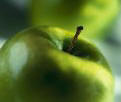
An apple a day reduces breast cancer
risk, says study
DAMIEN HENDERSON
(March 07, 2005)
EATING an apple a day can reduce the risk of developing breast cancer,
according to a study of rats by American food scientists.
Researchers at Cornell University said the chances of developing the disease
could be reduced by 17% by eating one apple a day.
Three apples a day could cut the risk by 39% and six apples by up 44%,
according to a report in the Journal of Agricultural and Food Chemistry.
The study, which was part-funded by the American apple industry, did not
establish whether apples offered the same protection to humans.
However, it was welcomed by cancer researchers in the UK, who said it
reinforced the dietary importance of fresh fruit and vegetables.
Dr Julie Sharp, from Cancer Research UK,
said: "This research demonstrates
apple extracts help prevent breast cancer in rats. We don't know if
these findings will translate to humans. But a healthy diet, including at
least five portions of fruit and vegetables a day, has an important part to
play in reducing the risk of certain cancers."
The researchers treated a group of rats with a known mammary carcinogen.
They then fed them the equivalent
of one, three or six apples a day.
As well as preventing the disease, the apples appeared to block the spread
of cancer that had already set in. After six months on the apple diet, the
number of tumours had fallen by 25% in those on the human equivalent of one
a day.
Breast cancer is the most common form of the disease affecting women in the
UK, with 38,000 new cases diagnosed every year – the equivalent of more than
100 a day.
The same researchers claimed five years ago that
phytochemicals found in fresh apples
had an antioxidant effect which helped inhibit liver and colon cancer cell
growth.
Antioxidants work by mopping up destructive molecules known as free
radicals, which in high levels can damage cell membranes and cell contents.
Professor Rui Hai Liu, who led the study, urged consumers to eat fresh fruit
rather than vitamin supplements. "Our findings suggest consumers may gain
more significant health benefits by eating more fruit … than expensive
dietary supplements, which do not contain the same array of balanced,
complex components."
He said the combination of chemicals in
fruit "cannot simply be mimicked" by dietary supplements.
Source:
The Herald
(more news) |
